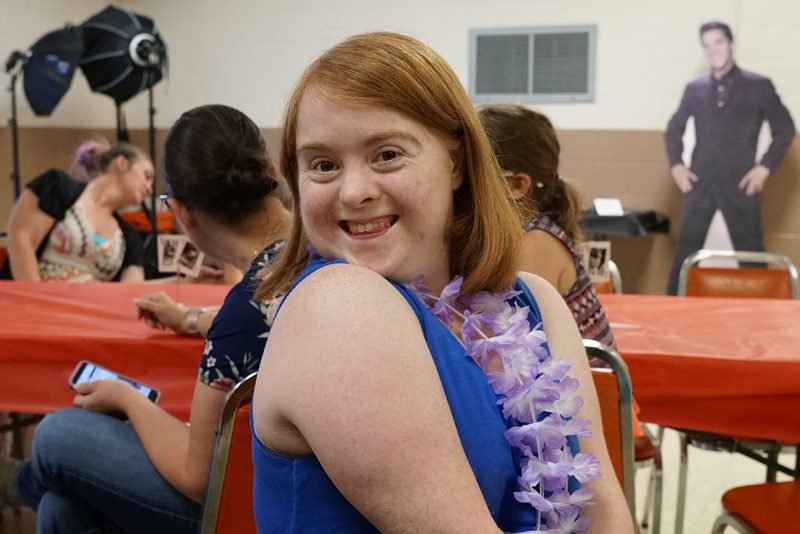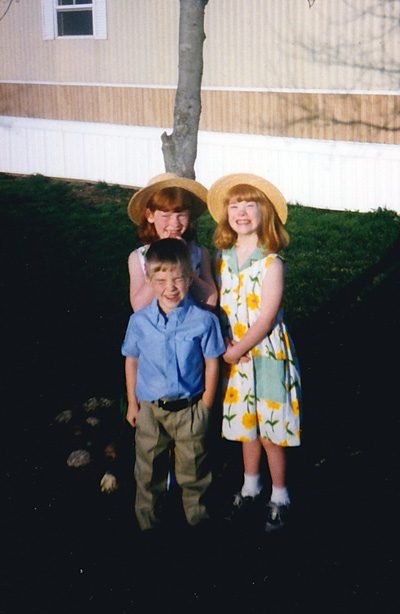
Several days ago, Polly and I, along with our 30-year-old daughter Bethany, were slowly traversing the aisles at the Defiance Meijer. As we walked down one aisle, a woman in her early 30s hesitantly said to us, “I don’t want to offend you. Do you mind if I ask you a few questions?” I said, “sure,” not knowing exactly what the woman wanted to ask. She replied, “I have a year-old daughter with Down syndrome. I see you have a child with it, and I have some questions.”
This is not the first time someone has stopped us in a store to ask us questions about Bethany. We have never thought such inquiries to be intrusive. We vividly remember when Bethany was a toddler and all the questions we had about Down syndrome. This was before the Internet/Netscape/AOL/Google, so information was hard to come by. We, of course, asked our primary care doctor, Bill Fiorini, a lot of questions, and availed ourselves to whatever books on Down syndrome were available from the local public library. Over the years, we have continued to educate ourselves about Down syndrome.
The woman proudly showed us a picture of her beautiful redhead girl. She asked, “how old was your daughter before she walked?” Polly replied, “seventeen months.” The woman said, ” I am in several Down syndrome support groups, and several people told me that I shouldn’t expect my daughter to walk until she was seven or eight.” I could see the pain in this mother’s eyes, pondering what the future might hold for both her and her daughter. I proceeded to tell her what I have told numerous questioning parents about living with a Down syndrome child:
- Children who have Down syndrome vary greatly one from the other. On a scale of 1-10, one being the Downs children you see on TV who can read and write, drive cars, and marry, and ten being the children who are so severely disabled that they require fulltime institutional care; every child is different. Be honest about where your child falls on this scale.
- Support groups and the opinions of friends and relatives are often unhelpful and can be harmful. Listen to what medical professionals tell you, and follow the course of treatment prescribed by them.
- Educate yourself about Down syndrome. Sometimes, medical professionals and social workers can suggest or demand things that are not in the best interest of your child. Bethany was born in the 1980s in rural Perry County — one of the poorest areas in Ohio. At the time, children with developmental disabilities were warehoused at a “special” school. Polly and I took one look at what was going on at the school and said, “our child will NEVER go to this school!” I told the social worker, “all I see is retarded children learning to be more retarded.” Harsh? Sure, but that’s what I saw at the time. (I never considered that they might have been doing the best they could with limited financial resources.) Every child with Down syndrome was running around slobbering with their tongues hanging out. Whatever our motivations might have been at the time, we wanted a better life for our daughter.
- Push your child. If you have older children, get them involved in helping your child grow physically and mentally. Having three older and two younger siblings really helped our daughter. We will forever be grateful for their help and support.
- Don’t baby your child. There’s a tendency to coddle a child with Down syndrome. You don’t want to see her hurt, so you become an overly protective parent. Doing so actually impedes the child’s developmental advancement. When Bethany was born, doctors missed the fact that she had Down syndrome. Her features are quite mild. Bethany was two years old before we learned through genetic testing at Ohio State University that she had Down syndrome. Bethany benefitted from this lapse in diagnosis. Her parents and siblings treated her as they would any other child. It wasn’t until she was sixteen months old that we began to wonder if something was “wrong” with her.

The woman asked us if Bethany had any health problems. We told her yes, and then recited the list of health problems she has had over the years. I reminded the woman that health ailments vary from child to child. Bethany has few health problems when compared to other people with Down syndrome: heart murmur, hyperthyroidism, an obsession with Rascal Flatts and vampires. Bethany has had surgery several times, including the removal of cataracts from both eyes. We went on to tell the woman all the things Bethany learned to do. Yes, later than when children typically learn things such as riding a bike, BUT she did successfully learn to do many of skills children typically conquer. It was an exciting day at the Gerencser home when Bethany — at age ten — finally learned to ride her bike without training wheels.
We could see the young woman’s demeanor lighten as she talked with us. We were glad that we could be of some help to her. Before we walked away, the woman shared a story about running into a “friend” at Walmart. The friend looked at her daughter and said, “you know, you can get an abortion for that now.” I thought, “OMG, I would have eviscerated her “friend” for daring to utter such stupidity.” Yes, many women have abortions once they find out that their child has the chromosome 21 abnormality. I would never fault them for having an abortion. I know that no test can show a woman to what degree her fetus will be affected by Down syndrome. Many women don’t want to take the risk of having a child who is severely disabled. That said, this woman’s child is already born. A real friend would support her and ask if there was anything she could do to help.
About Bruce Gerencser
Bruce Gerencser, 62, lives in rural Northwest Ohio with his wife of 41 years. He and his wife have six grown children and twelve grandchildren. Bruce pastored Evangelical churches for twenty-five years in Ohio, Texas, and Michigan. Bruce left the ministry in 2005, and in 2008 he left Christianity. Bruce is now a humanist and an atheist. For more information about Bruce, please read the About page.
Are you on Social Media? Follow Bruce on Facebook and Twitter.
Thank you for reading this post. Please share your thoughts in the comment section. If you are a first-time commenter, please read the commenting policy before wowing readers with your words. All first-time comments are moderated. If you would like to contact Bruce directly, please use the contact form to do so.
Donations are always appreciated. Donations on a monthly basis can be made through Patreon. One-time donations can be made through PayPal.

She’s a sweet girl, Bruce.
It’s great that you are able to answer questions for people about Down Syndrome. There was a boy at our church – David – who was a real character, and his parents were very open with everyone about David’s needs. As kids, we all knew there were certain things David might not get right away, but he was very sweet and hilarious – he loved telling jokes. His parents tried to keep him in the mainstream as much as possible (it was the 70s and 80s so no small feat).
What a cutie Bethany is ! My husband and I have only one child (and feel super lucky to have her since we had a few false starts and were a few months from 40 when she was born), but I think a lot of your advice about children with Down Syndrome could and should apply to all children: be realistic about your child’s abilities, don’t baby children, and push them to be and do the most that they can. My sister retired after 45 years as a school psychologist at a school for the blind. There were many other children of different abilities and some with very serious challenges. My sister always told me that the children at her school were expected to learn as much as they could with the goal of participating in the bigger world to the best of their abilities. My sister is wise and so are you. It sounds like you have a great bunch of kids. I hope Polly is improving and getting back to normal life.
“You can abortion for that now,” said to the parent of a baby (that’s a real live, breathing on its own, no longer hiding it its mother’s uterus baby, in case the people who can’t tell the difference between an embryo, a fetus, and a post-birth infant are reading.
If someone had said that to one of my nieces in a similar situation, I would have had a hard time not bringing my cane into play. Yes, if testing shows the abnormality in a fetus, I understand that some parents might make the decision to abort. There are lots of factors that go into such decisions, and hey, it isn’t my business anyhow. But to imply to a mother that she should have aborted her baby is downright evil.
You’ve posted many photos of Bethany, and if she isn’t a reasonably happy person, she’s hiding it well. She has a family who loves her, and parents and sibs who have probably gotten easier to live with over the years as the repressive blanket of Evangelicalism was worn thin and then discarded. Nobody’s life is perfect, but also nobody is somehow a lesser person for having a disability (or what is effectively a disability in our culture).
If anyone should have been aborted, it is the “friend” of that woman who asked about Bethany!
Kudos to you, Bruce, and Polly for being supportive, loving parents.